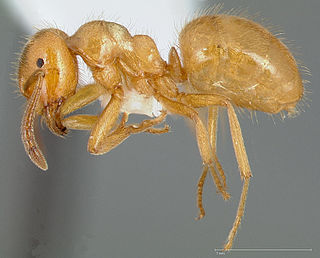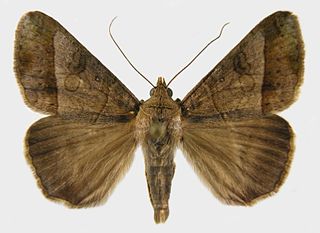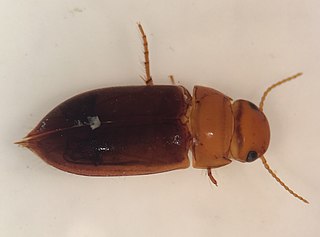
The Piophilidae are a family of "true flies", in the order Diptera. The so-called cheese flies are the best-known members, but most species of the Piophilidae are scavengers in animal products, carrion, and fungi. They may accordingly be important in forensic entomology and medical entomology. For a fly maggot, the larvae of many species have an unusually well-developed ability to leap when alarmed or when abandoning their larval food to pupate; they accordingly may be known as cheese skippers or other kinds of skippers according to their food source.

Lasius is a genus of formicine ants. The type species for this genus is the black garden ant, Lasius niger. Other major members, which live in drier heathland, are the cornfield ant, L. neoniger, and L. alienus. Other species include the temporary social parasites of the L. mixtus group and the hyper-social parasite Lasius fuliginosus. Lasius flavus is also a commonly seen species, building grassy hillocks in undisturbed pasture. In the Alps, these mounds – always aligned east to catch the first rays of the rising sun – have been traditionally used by goatherds as natural compasses. Species in the subgenus Acanthomyops, in particular L. interjectus and L. claviger, are commonly known as citronella ants due to their citronella-like smell.

Persicaria perfoliata is a species of flowering plant in the buckwheat family. Common names include mile-a-minute, devil's tail, giant climbing tearthumb, and Asiatic tearthumb. It is a trailing herbaceous annual vine with barbed stems and triangular leaves. It is native to most of temperate and tropical eastern Asia, occurring from eastern Russia and Japan in the north, and the range extending to the Philippines and India in the south.

Terminalia is a genus of large trees of the flowering plant family Combretaceae, comprising nearly 300 species distributed in tropical regions of the world. The genus name derives from the Latin word terminus, referring to the fact that the leaves appear at the very tips of the shoots.

The Japanese rice fish, also known as the medaka, is a member of genus Oryzias (ricefish), the only genus in the subfamily Oryziinae. This small native of Japan is a denizen of rice paddies, marshes, ponds, slow-moving streams and tide pools. It is euryhaline, occurring in both brackish and freshwater. It became popular as an aquarium fish because of its hardiness and pleasant coloration: its coloration varies from creamy-white to yellowish in the wild to white, creamy-yellow, or orange in aquarium-bred individuals. Bright yellow, red or green transgenic populations, similar to GloFish, have also been developed, but are banned from sale in the EU. The medaka has been a popular pet since the 17th century in Japan. After fertilization, the female carries her eggs attached anterior to the anal fin for a period before depositing them on plants or similar things.

Lasius latipes is a species of ant in the genus Lasius. It is native to the United States. It is a temporary social parasite, which means queens typically invade nests of Lasius neoniger to begin their own colony.

Citrus macroptera, natively known as hatkhora or cabuyao, Melanesian papeda, or wild orange, is a semi-wild species of citrus native to the Sylhet region of Bangladesh and the Barak Valley Division of the Indian state of Assam.
Citrus latipes, commonly called "Khasi papeda", is sometimes mistakenly identified as Kaffir lime. Native to Northeast India, the khasi papeda is a small, thorny tree that closely resembles both kaffir limes and ichang papedas. Though rarely eaten, and extremely rare in cultivation, the fruit is edible.

Mocis latipes, the small mocis moth or striped grass looper, is a species of moth of the family Erebidae. It is found from North America (from southern Ontario and Quebec to Florida, west to Arizona, north to Minnesota and south through Central to South America.

Celina is a genus of predaceous diving beetles in the family Dytiscidae. There are at least 30 described species in Celina.
Copelatus latipes is a species of diving beetle. It is part of the genus Copelatus in the subfamily Copelatinae of the family Dytiscidae. It was described by Sharp in 1882.

Arthrochilus latipes, commonly known as robust elbow orchid, is a flowering plant in the orchid family (Orchidaceae) and is endemic to the "Top End" of the Northern Territory in Australia. Each plant has from two to four ground-hugging leaves and between three and fifteen flowers during the wet season and the species often forms spreading colonies on sandstone escarpments. Like others in the genus, the flowers are pollinated by a species of thynnid wasp.

Excirolana is a genus of isopods in the family Cirolanidae. There are about 15 described species in Excirolana.

Lesteva is a genus of ocellate rove beetles in the family Staphylinidae. There are at least 60 described species in Lesteva.

Rhinoncomimus latipes, the mile-a-minute weevil, is a species of weevil in the family of beetles known as Curculionidae.

Crabro latipes is a species of square-headed wasp in the family Crabronidae. It is found in Central America and North America.
Leptometopa latipes is a species of freeloader flies in the family Milichiidae.

Protopiophila is a genus of cheese skippers. There are eleven described species in Protopiophila.

Cydnus is a genus of burrowing bugs in the tribe Cydnini. There are at least three described species in Cydnus.

Eunapiodes is a genus of grasshoppers in the family Pamphagidae. There are at least four described species in Eunapiodes, found in North Africa.

















